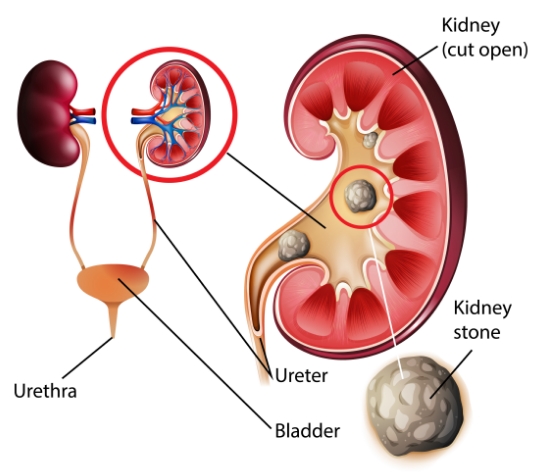Kidney stones (Urolithiasis)
What are kidney stones?
Kidney stones are small masses of minerals and acid which develop when the kidneys do not effectively flush waste product out through the urine. Stones less than 5mm in diameter most often pass without complication, but those larger may require intervention.
Sandhurst Urology offers diagnosis, management, and medical intervention for kidney stones from our clinic in Bendigo. To book an appointment, please ask your GP for a referral or call us directly.

Symptoms
Kidney stones do not cause symptoms until they move around within the kidney or shift into a ureter. They are typically diagnosed either after they cause pain, or sometimes if noticed in an x-ray or CT scan intended to look at other bodily structures.
Symptoms of kidney stones may include:
- Severe pain (renal colic)
- Nausea
- Chills
- Fever
- Blood in the urine
- Needing to urinate frequently
- Inability to urinate
- Urinating in only small amounts
- Discoloured or foul-smelling urine
Remember that your own experience with kidney stones is individual – you may not experience every symptom and may experience slightly different symptoms to those specified. For further advice and diagnosis, book an appointment at Sandhurst Urology.

Treatments for kidney stones
Although painful, many kidney stones pass through the urinary tract without intervention. Dr Hall may recommend management strategies or medications which aim to make the process as comfortable as possible, which may include:
- Pain medication – if over-the-counter medication cannot manage your pain, Dr Hall may prescribe stronger medication to increase your comfort until the stone passes.
- Anti-nausea medications – passing a kidney stone may produce nausea related to your pain. You may receive an anti-nausea medication prescription to increase your comfort.
- Drinking water – this causes your body to produce more urine, which can help the stone pass faster. Increasing your water intake may be recommended alongside other therapies.
- Diuretics – these medications encourage your body to produce more urine, helping you pass the kidney stone faster. You may be encouraged to increase your water consumption alongside taking them.
- Alpha blocker medications – these relax the muscles in the lower part of the bladder and make passing stones easier.
- Urinary alkalisers – stones comprised of uric acid can sometimes be dissolved with medications that alkalise your urine. Alkalising medications may be prescribed alongside allopurinol, a medication used to decrease levels of uric acid in the blood.
Medical interventions for kidney stones
Larger kidney stones often cannot pass on their own and require medical intervention, aiming to break the stone into smaller parts which the body can pass or remove it surgically.
Treatments offered through Sandhurst Urology’s Bendigo clinic include:
- Extracorporeal shock wave lithotripsy (ESWL) – this non-invasive treatment uses x-ray guided shockwaves to break a kidney stone into smaller pieces, making it easier to pass. No cuts are made in the skin, and you can usually leave the clinic straight afterward to pass the kidney stone at home.
- Pyeloscopy with laser – Dr Hall passes a small fibre-optic telescope into the kidney through the bladder. The telescope has a small laser attached to it which helps break up stones, and tiny baskets to catch stone fragments. The whole procedure is performed through the urethra, so no incisions are made.
- Percutaneous nephrolithotomy (PNCL) – the kidney stone is surgically removed through a very small incision in the back. PNCL is usually used for removing large kidney stones (over 2cm in diameter) which will not pass on their own, and removes the stone in its entirety and you will not have to pass it afterwards.
Preventing kidney stones
In addition to specific advice provided by your medical team, the following strategies may reduce your likelihood of developing kidney stones:
- Drinking water – this encourages your body to produce more urine, flushing out the minerals which form kidney stones.
- Diuretic medications – Dr Hall may prescribe medication which encourage urine production, helping your body eliminate the minerals which cause kidney stones.
- Other medication therapies – If you have developed a kidney stone previously, you may receive medications which help your body regulate the minerals it was made up of.
- Weight management – some studies show a relationship between higher body weights and kidney stone development. Maintaining a healthy weight may reduce the chances of stones forming.
- Dietary changes – a low-protein diet (such as vegetarianism) may reduce kidney stone recurrence. Lowering dietary salts, oxalate, and calcium intake can also reduce your chances of developing future kidney stones, depending on the type of stones you have.
As with any condition, always seek medical guidance to prevent and treat kidney stones effectively. Ask your GP for a referral to Dr Rohan Hall at Sandhurst Urology for individualised advice.

Providing Excellent Urological Care of the Highest Standards
Book a consultation with Sandhurst Urology today